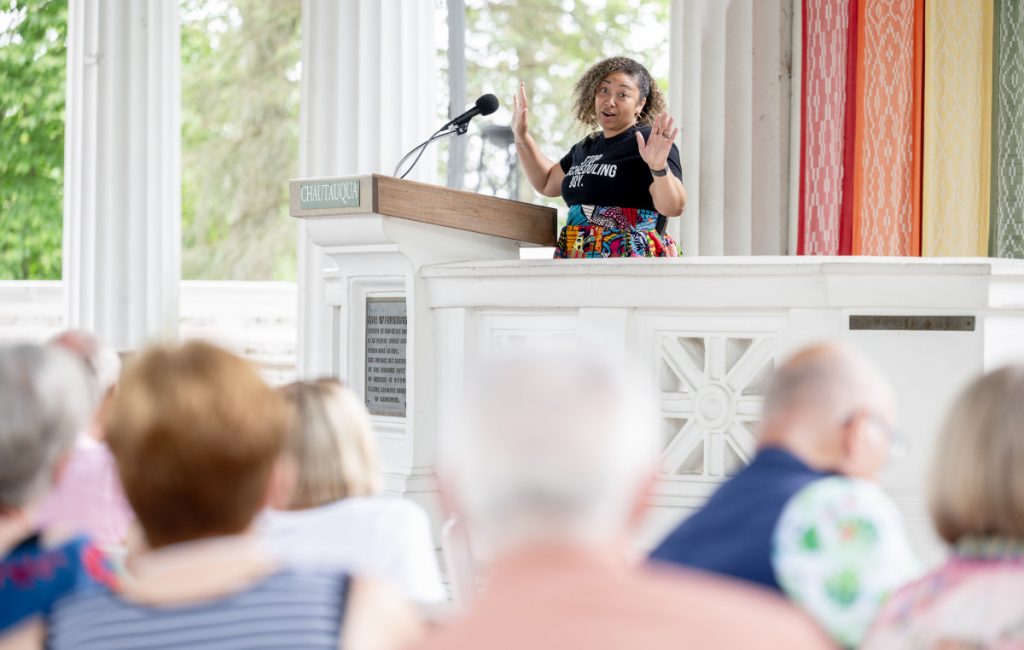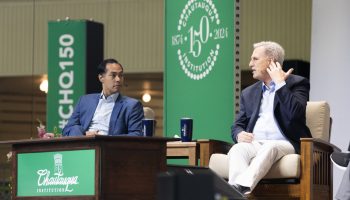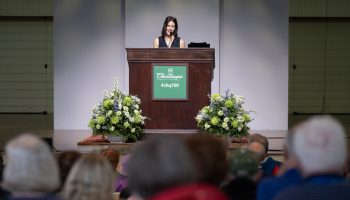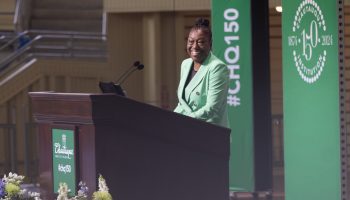
Sara Toth
Editor
When was the last time, the Rev. Lakisha R. Lockhart asked, you played?
“I want you to just to take a moment, and I want you to imagine and just really go back to the last time you played — the last time you actually played; not on accident, when you did it on purpose,” Lockhart opened her lecture last Thursday in the Hall of Philosophy.
Take a minute, go back to that place, she said. What were you doing?
Lockhart spoke as part of the Interfaith Lecture Series and the theme “A Spirit of Play.” Lockhart, an assistant professor of Christian education at Union Presbyterian Seminary, focuses her research on religious education; practical, liberation and Womanist theologies; ethics and society; multiple intelligences; embodied faith and pedagogies; theological aesthetics’ theopoetics; and, perhaps most importantly, creativity, imagination and play. As she put it last Thursday, she believes in the combination of theory and practice. For her lecture, she wore a shirt emblazoned with the words “Stop Rescheduling Joy.”
Lockhart’s thinking on play comes from “a lot of different places,” she said. She cited Johan Huizinga, a Dutch philosopher who wrote about the culture of play in his book, Homo Lundens — literally, humans who play.
“It’s this beautiful space — it is cultural, it can be cultural, because we all play in different ways,” Lockhart said. In those differences, people can learn from each other, because the ways we play aren’t actually different at all.
To illustrate this, Lockhart asked her audience to think of the nursery rhyme “Miss Mary Mack.” She didn’t even sing it; just asked Chautauquans to think of it.
“We just had a similar experience, because I didn’t even sing the song — even though I saw you singing it in your head,” she said. “We have a similar experience. And even though we might have different ways of understanding it, we were still able to find a commonality. That’s part of what play can do.”
Like Rabbi Michael Shire the day before her, Lockhart drew on Jerome Berryman, the founder of the concept of Godly Play, and coupled him with English psychoanalyst D.W. Winnicott, who conceptualized the idea of a “true” self and a “false” self.
Play, Lockhart argued, brings about that true self. It creates a space that allows people to live authentically, because it creates a world of possibility.
“We can imagine how we want to show up, who we want to be, and then maybe start putting that into practice,” she said. “It’s this beautiful way of trying on things in a more low-stakes way. But then we still get to see how it works. … This often works really, really well especially for young people, because they’re still figuring out, identity-wise, who they are, what they’re trying to be. … But also, I just think as adults, we should always continue to play. It just makes us better people.”
There’s a duality, Lockhart said, especially in theological spaces, that tends to separate the mind and the body. Like bell hooks, Lockhart argues that the two should go together: “Our body needs our mind, and our mind needs our body.”
Play, Lockhart said, “is an embodied aesthetic experience and cultural expression. It’s part of what makes us human. It is the ontology of being.”
Humans are naturally playful; but taking an epistemological view, “it is the way we come to know the world.” Further, how we play and how we show up in our play “tells us a lot about who we are, and how we have been formed in our lives, in or faith, in what we think of God,” she said.
The space one creates for play, mental wellness, and self-love, Lockhart said, speaks to the commitment to the survival of, and the flourishing of, everyone. Or, as Fannie Lou Hamer put it, “Nobody’s free until everybody’s free.”
This thinking has been key to Lockhart’s framing of Womanism, in which play is key, and in her Biblical framing.
“I find the Bible to be very playful,” she said. “I literally cackle when I read the Bible, I promise you; this is my blessing.”
From God creating a giraffe — “Who ever would have thought to making a giraffe? I mean, have you ever really thought about a hippo?” — to images like Lot’s wife turning into a pillar of salt, there is a spirit of playfulness deeply embedded in a deeply serious text.
“As a Black woman, the fact for me as a Christian, knowing that Christ came in bodily form, means something,” she said. “The fact that it was about flesh and body means that my body matters, and that my flesh matters, and that I need to do something. How do I care for it? How do I tend to it?”
Part of that care, that divine intentionally, should be a sense of both play, and of rest.
Lockhart took the audience through a game of Red Light, Green Light, but centered around questions of their lives — whether you’re at “Green Light” moments, when things are going wonderfully to plan, or “Red Light” moments when you realized something wasn’t quite working the way you’d like Lockhart said the opportunities within the game can be applied to more serious reflection, “so it doesn’t feel so harsh.”
“Hopefully, as we (wrap up our time here), maybe you want to play more,” Lockhart said. “Maybe now you can maybe think of a place or two to start, but that you will do it on purpose and not just by accident — and that you know it’s OK to do it on purpose, even if you have a plan a little bit of it to start with. You’ll get there and it’s wonderful and it’s amazing. … No matter what, invite other people to play with you, My hope is that you will go and play on purpose.”




